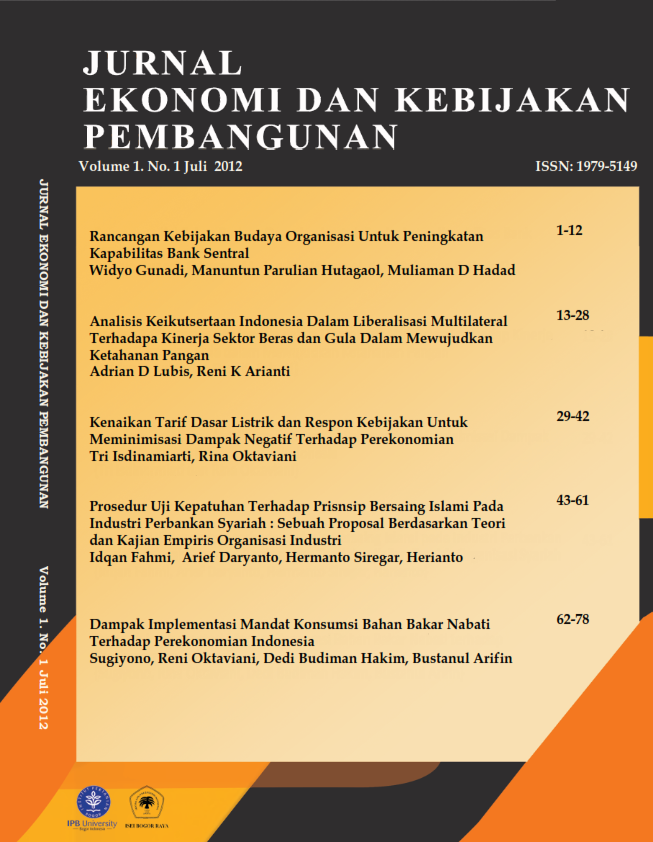DAMPAK IMPLEMENTASI MANDAT KONSUMSI BAHAN BAKAR NABATI TERHADAP PEREKONOMIAN INDONESIA
Abstract
Before 2006, biofuel mandate consumption was expected to contribute to increase economic growth and job creation, decrease poverty, mitigate climate change, and improve energy security. The objective of the study is an analysis of implementation of biofuel mandate in Indonesian economy. This research applied the long run of Recursive Dynamic General Equilibrium (RDGE) model by Indonesian Forecasting. Three simulations are used to increase of biofuel demand, seconds to increase of biofuel agriculture land expansion, deforestation, and rise fixed capital, and to last change agricultural and biofuel productivity. The policy of biofuel mandate implementation is effectively to increase economic growth, rise household income, and improve carbon emission, but less effective to built food security and feed, decline employment by industri for non biofuel agriculture, and descend forest and other forest outputs in Indonesia. The policy implication is to increase output for non biofuel agriculture by rising productivity and policy of import and inflation targetting to take sides for welfare farmer’s and food employee’s.
Keywords: Biofuel, RDGE, food security, carbon emission
References
Badan Pusat Statistik [BPS]. 2008. Sistem Neraca Sosial Ekonomi Indonesia 2005. Badan Pusat Statistik, Jakarta.
________________________. 2009. Tabel Input Output Indonesia UpDating 2008. Badan Pusat Statistik, Jakarta.
Beeman, P. 2007. Biofuel Plants Generate Environmental Problems in Iowa. The Bioenergy Blog, 3 June 2007. Retrieved on 1 March 2008 from http:/bioeconomyblog.blogspot.c om/2007/06/dm-register-biofuelplantsgenerate. html.
Cororaton, C. and E. Corong. 2006. Agriculture-Sector Policies and Poverty in the Philippines: a Computable GeneralEquilibrium (CGE) Analysis. MPIA Working Paper 2006-19, Poverty and Economic Policy Research Network.
Departemen Energi dan Sumberdaya Manusia Republik Indonesia [Departemen ESDM RI]. 2008. Timnas BBN Gelar Workshop Sosialisasi Pengembangan Bahan Bakar Nabati (BBN). Departemen Energi dan Sumberdaya Manusia, Jakarta.
Kementerian Energi dan Sumberdaya Manusia [Kementerian ESDM]. 2011. Statistik Energi Baru terbarukan. Kementerian Energi dan Sumberdaya Manusia, Jakarta.
Dillon, H.S., T. Laan, and H.S. Dillon. 2008. Biofuels-At What Cost? Government Support for Ethanol and Biodiesel in Indonesia: One of a Series of Reports Addressing Subsidies for Biofuels in Developing Countries. The Global Subsidies Initiative of the International Institute for Sustainable Development, Jakarta.
Food and Agriculture Organization [FAO]. 2008. Biofuels: Prospect, Risks, and Opportunities. Food and Agriculture Organization of the United Nations, Rome.
Horridge, J.M, B.R. Parmenter and KR. Pearson. 1993. ORANI-F: A General Equilibrium Model of the Australian Economy. Economic and Financial Computing, 3:71-140.
Koh, L.P. and D.S. Wilcove. 2007. Cashing in Palm Oil for Conservation. Nature (448): 993-994.
Oktaviani, R. 2000. The Impact of APEC Trade Liberalisation on Indonesian Economy and Its Agricultural Sector. Thesis of Doctor of Philosophy. Department of Agricultural Economics, University of Sydney, Sydney.
Oktaviani, R. 2008. Model Ekonomi Keseimbangan Umum: Teori dan Aplikasinya di Indonesia. Departemen llmu Ekonomi, Fakultas Ekonomi dan Manajemen, Institut Pertanian Bogor, Bogor
Park, J. 2010. Projection of Long-Term Total Factor Productivity Growth for 12 Asian Economies. Working Paper Series no. 227. Asian Development Bank, Manila.
Rodriguez, U.E. 2009. Biofuel and the Environment: An Analysis Using A Computable General Equilibrium Model the Philippines. Working Paper No.2009-15. CEM Working Paper Series. College of Economics and Management University of the Philippines Los Banos, Laguna
Sekretariat Kabinet [Setkab]. 2006. Instruksi Presiden Republik Indonesia Nomor 1 Tahun 2006 tentang Penyediaan dan Pemanfaatan Bahan Bakar Nabati (Biofuel) sebagai Bahan Bakar Lain. Sekretariat Negara Republik Indonesia, Jakarta.
________________________. 2006a. Peraturan Presiden Republik
Indonesia Nomor 5 Tahun 2006 tentang Kebijakan Energi Nasional. Sekretariat Negara Republik Indonesia, Jakarta.
Ziegler, J. 2008. Pejabat PBB Sebut Bahan Bakar Nabati “Kejahatan Atas Kemanusiaan”. Green Press Network dalam Antara, 17 April 2008.
Authors

This work is licensed under a Creative Commons Attribution-NonCommercial-ShareAlike 4.0 International License.
The authors who publis article(s) in Jurnal Ekonomi and Kebijakan Pembangunan have to understand and agree that the copyright of article published is owned by Jurnal ekonomi and Kebijakan pembangunan including to reproduce, distribute and sell this journal to public.





